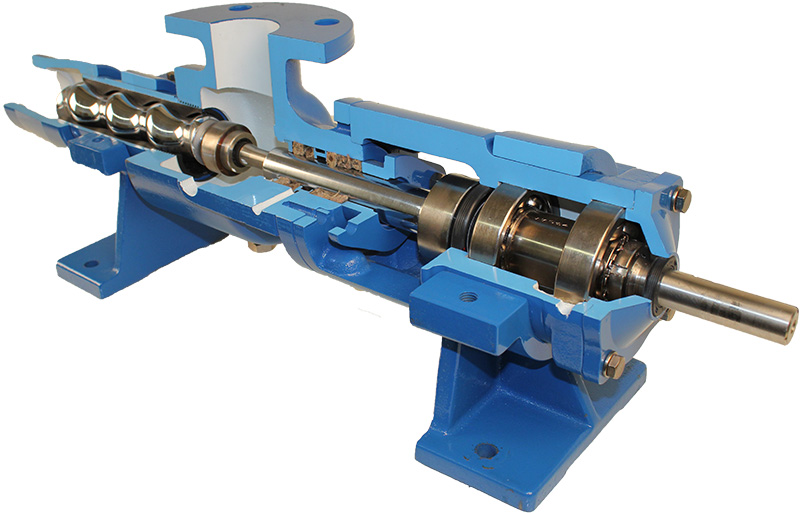When to use Progressive Cavity Pumps
The Progressive Cavity Pump is an extremely versatile pump that can be used in many different pumping applications. It offers all the advantages of a positive displacement pump and is specially designed for abrasion resistance in tough pumping applications.
The progressive cavity pump is a positive displacement pump. This is different than the more commonly used centrifugal pump. A centrifugal pump is a good, economical choice when pumping water like fluids with low viscosity and when a fixed flow and constant discharge pressure are the basis of the application. A well-applied centrifugal pump will offer years of reliable service in simple pumping applications.
Viscosity
A progressive cavity pump is used when the pumping application is not suited to a centrifugal pump. One of the clearest examples of when to use a progressive cavity pump is when the liquid has a higher viscosity, or thickness, than water. Centrifugal pumps become very mechanical and volumetrically inefficient when the viscosity of the liquid goes up, meaning the flow goes down and the power consumption goes up. The opposite occurs with a progressive cavity pump, the mechanical efficiency and volumetric efficiency goes up when the viscosity increases, lower power and more flow.
A progressive cavity pump is therefore ideal for liquids with higher viscosities. In addition a progressive cavity pump will have about the same flow no matter what the viscosity of the liquid is. If you have a pumping application where you need a constant flow, but the liquid viscosity is variable and will change, then the PC pump is an ideal choice.
Varying Flow
Additionally a progressive cavity pump is an ideal pump when the application requires a varied flow. A progressive cavity pump has a precise flow per revolution of the pump. It is therefore quite easy to regulate the pump flow by just simply regulating the pump speed. Modern pump speed controllers like variable frequency drives (VFD’s) are well suited to be used with progressive cavity pumps for varying pump speed and flow control.
We have even supplied PC Pumps for boiler feed applications which is normally a classic centrifugal pump application. The customer uses the PC pump due to its varying flow requirements.
Suction Conditions
Another good example of when to use a progressive cavity pump is when the suction conditions of the pumping applications are not ideal. A progressive cavity pump requires much lower Net Positive Suction Head (NPSH) as compared to a centrifugal pump because the internal pump velocity is lower. A progressive cavity pump can pump when the suction pressure is as low as 28" of mercury (Hg), a centrifugal pump cannot do this. A progressive cavity pump will easily fill and pump in difficult applications when a centrifugal pump will not.
Seperating Fluids
Progressive cavity pumps are ideal for applications where the liquid is shear sensitive again because of lower internal velocity. A good example would be pumping oil and water mixtures to separation devices. The separation device works much better when the oil droplets are larger. A progressive cavity pump will not change the oil droplets where a centrifugal pump will emulsify the oil and make the oil droplets very small and reduce the separation performance of the separator.
Abrasive Solids
The best application for a progressive cavity pump is when the liquid contains abrasive solids. Most other types of positive displacement pumps can’t pump solids very well or for very long due to their close tolerances and all metal designs. A gear pump or vane pump will simply wear out when solids are present in the liquid and the same would also happen to most centrifugal pumps and they could clog. A progressive cavity pump is designed to last longer than all other pumps on abrasive applications. The pump design with the rotor and stator is the heart of the pump design for abrasion resistance. The internal velocity of the liquid as it travels through the pump is much lower than other types of positive displacement pumps and centrifugal pumps and the rubber stator.
This is because the flow travels axially, "long ways" through the pump and is not traveling around the outside of a casing in a high speed circle like it would in other pump designs. The abrasive particles are traveling in parallel to the pumping surfaces and at low speeds thus not abrading them. In addition the rubber stator of a progressive cavity pump has "bounce". If a particle comes in contact with the stator, the stator has some flexibility to move and not abrade, this makes it last longer than the metal parts in other types of pumps on abrasive applications.
Contact Us

As you can see the progressive cavity pump is an ideal alternative to other pump designs for many tough applications. At Liberty Process Equipment, we stock many pump sizes and models at our Chicago facility for a fraction of a gallon up to 2000gpm. We have pump application engineers on hand waiting for your pumping applications. Please contact us.
Pumps and pump parts offered for sale by Liberty Process Equipment, Inc. are made in the United States, Germany, India, Spain, Argentina and Brazil.
*Liberty Process Equipment, Inc. is not affiliated with nor distributor for Seepex®, Allweiler®, Moyno®, Tarby®, Netzsch®, or Continental Inc.® All referenced product names, brands, models, or part numbers is solely for identification purposes. Seepex® is a registered trademark of Seepex®. Moyno® and Tarby® are registered trademarks of Robins and Myers® and NOV®, Netzsch® Incorporated is a registered trademark of the Netzsch® Group, Allweiler® is a registered trademark of Colfax® Corporations Continental® Pumps is a Trademark of Continental® Ultra Pumps.